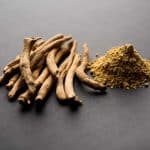So does Ashwagandha affect birth control? No, Ashwagandha does not affect birth control. There is no conclusive evidence at present that suggests Ashwagandha has any effect on efficacy of birth control or other methods of contraception, such as oral contraceptives.
However, there are limited studies suggesting that Ashwagandha might have certain affects on hormone product within the body, which may interact with contraceptive medications. Ashwagandha has been shown to have adaptogenic properties, meaning it can help to modulate the body’s stress response by balancing levels of specific hormones, including cortisol and testosterone. However, it is unclear if these hormone effects are substantial enough to interact with the hormonal components of contraceptive medications. If you are taking birth control medications and are considering taking Ashwagandha, it is always best to talk with a health care professional before making any changes in your drug regimen.
They can give you tailored recommendations and guidance depending on your particular health needs and health history.
Uses of Ashwagandha
Ashwagandha is an ancient herb that has been used for alternative medicines for years. The berry and the root are used in India and Africa for medical purposes.
It is a recent research topic, and is growing in popularity because people are reporting some health benefits. It is typically used in Ayurvedic medicine, a system of holistic healing practiced in India for more than 3000 years. Ayurvedic practitioners believe all of the body’s systems are interwoven, and that an individual needs to be treated holistically rather than just focused on certain symptoms.
The word Ashwagandha itself is derived from two words from Sanskrit, an ancient Indian language. The word “ashva” means horse, while “ganda” means odor.
The two words combined means to smell like horse. According to the information that is available, it really does smell like a horse.
Other Pros and Cons of Ashwagandha
Ashwagandha is considered to be an adaptogen, a plant species that is most known for helping to deal with stress. When our bodies are stressed, the chemical cortisol is released into the bloodstream. Adaptogens are said to regulate the body’s cortisol levels, thereby decreasing stress levels. Stress relief is one of the common uses of ashwagandha. Many websites, like Healthline, reports there are science-based studies showing the benefits of ashwagandha.
It is used successfully to lower blood sugar levels in diabetics and to alleviate symptoms of anxiety. Other conditions the herb helps with include depression and infertility. It is even known to have anti-cancer properties. The adaptogenic properties of Ashwagandha can even affect female hormonal levels. It has been prescribed for menstrual symptoms and low libido in antiquity.
Ashwagandha and contraception have not been studied for interactions, so you must consult with your physician if you are taking ashwagandha. The safety of mixing Ashwagandha with contraceptives cannot be guaranteed because of a lack of studies, although Ashwagandha on it’s own is very safe. Consumers are warned against using this during pregnancy or breast-feeding. People with diabetes are also warned against using it because of the interaction of blood sugars as it’s known to lower blood sugar levels.
Other Supplements and Interactions with Oral Contraceptives
There are certain herbs and supplements that may affect the effectiveness of oral contraceptives. St. Johns Wort is known to be the worst offender. It is a powerful supplement used to treat depression and menopausal symptoms. Because it may affect hormone levels, it can decrease the effectiveness of contraceptives.
Garlic, also known as allium, is known to have certain effects on the body. It is used to treat high blood pressure and elevated cholesterol. When used in foods, it is thought that the tiny amounts do not cause anything. However, when taken as a garlic pellet, it can affect hormonal levels and oral contraceptives.
Saw Palmetto is one of the least known supplements on the list. It is a type of small palm tree that is found in the Southern regions of the United States. It lowers estrogen levels in the body, the primary component in oral contraceptives. It is not recommended that you take this supplement if you are using contraceptives.
Alfalfa is an herb sometimes used as a medicine. The leaves, sprouts, and seeds of the plant can be used as is, or ground up and used as a powder. It contains substances known as saponins, which people who have cancers that involve estrogen hormones should avoid. Because it is known to interfere with estrogen levels, it should not be taken together with oral contraceptives, because this can reduce their efficacy.
Because the FDA does not regulate herbs and supplements, their ability to interact with other medications is not always known. Oral contraceptives fit into this category, and you should be cautious about taking them together with supplements. Remember, always consult with your healthcare provider before taking supplements.















